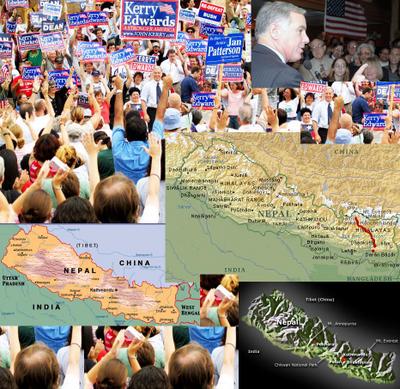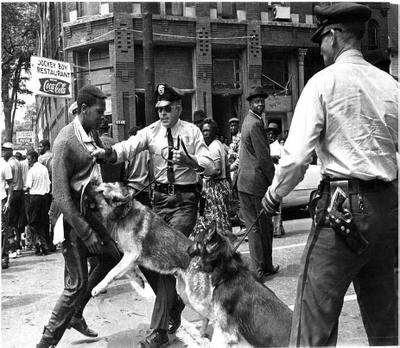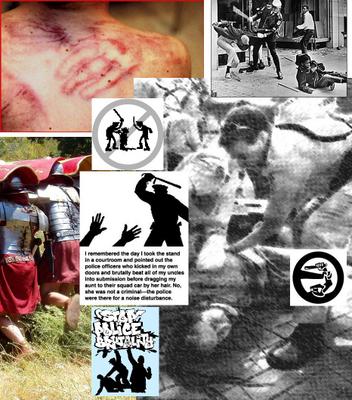
Nepal has 27 million people, so you should think of it as California. It is big. It is the second poorest country on the planet with much of the wealth concentrated in the capital city Kathmandu. It has the gorgeous Himalayas in the north, but more than half its people live in the southern plains of the Terai. I am from the south. I went to school in Kathmandu though, a few years junior to the prince who massacred most of his family in 2001, and classmate to the current prince.
Nepal had a democratically elected government in 1959. In 1960 the current king's father brushed it aside in a military coup promising to restore democracy in six years. It was not until 1990 that the people were able to earn back democracy through a mass movement.
In 1996 the Maoists started their insurgency. It grew over the years, and grew even more after the Shakespearean palace massacre of 2001, and several rounds of peace talks, each of which failed because the government refused to come around to the Maoist middle ground demand of a roundtable conference, interim government and a Constituent Assembly. Mind you, it is a Constituent Assembly that the US brought forth in Iraq.
The current king is the middle brother. The oldest and the youngest died in the massacre.
Democratic prime minister Deuba dissolved the parliament in 2002. But he was not able to hold elections within six months as required by the constitution because the Maoist insurgency was too strong in most parts of the country. The king dismissed him using emergency powers. After that he appointed a succession of prime ministers. On February 1, 2005, he went overboard. He totally took over. Ever since the Deuba dismissal, the royal palace and the army budgets have been increased like crazy. Nepal has one of the worst human rights records on the planet, bad enough that some in the ruling clique might as well end up at the Hague.
As of now, this is a triangular conflict: the Monarchists, the Maoists and the democrats.
On 2/1, the king proclaimed he will rule for three years, that he will hold municipal elections within a year, and parliamentary elections within three. And once the country has a parliament, democracy will be back on track. He has interpreted the emergency articles in the 1990 constitution to basically revive his father's brand of autocracy and people, but has refused to use the same to revive the 1999 House that got dismissed early and unwisely by Deuba. The Supreme Court is now looking into the issue, but whether or not it will revive the House is anyone's guess.
The Deputy Prime Minister who got deposed and arrested on 2/1 was recently in New York City and I got to show him around. I also have been in direct contact with many leaders in the democratic camp. Recently I received an email from Madhav Nepal who leads the largest party in Nepal and might as well emerge the commander of the movement.
The Maoists launched their insurgency with the goal of establishing a communist republic. But now they claim their goal is a Democratic Republic, like in America or India, democracy but no king. Curiously the parliamentarty democratic parties have also gone impatient on the king and have turned republican.
Only a few weeks back the Maoists declared a unilateral ceasefire and totally threw the regime off balance. The king had to cancel his trip to Europe and America after that. But the king and his coterie have not reciprocated. I think that shows they need a low intensity insurgency to continue in power.
My efforts are geared towards leaving the king a respectful opening with a limited time frame, and if he does not come around to it, to forge a strong alliance of the Maoists and the democrats to herald a democratic republic into the country. More important, I have also proposed a constitution that might establish a real cutting edge democracy in Nepal. One that is as classless as it gets. A total, transparent democracy. It is the same concept that I have been trying to apply to Democracy For America. So in a way, Nepal is also a human laboratory for the American progressives.
My emphasis has been to realize there is no military solution to the insurgency and to engage the Maoists in a respectful dialogue, something no Nepali government has done to date, and instead they blame the Maoists for the breakdowns in the prior peace talks. I have gone so far as to synthesize their emphasis on classlessness and the democrats' need for a peaceful, multi-party democracy. There are some very smart people in the Maoist leadership, and I do feel they are capable of reason. I mean, I am for an interim government and a Constituent Assembly with or without the Maoists. So of course I think the country should come around to their just demands.
I expect this winter to really heat up. I expect there to be a major mass movement for democracy in the country. And I would like to extend all moral and logistical support I can. But so far my fellow democrats have not even come up with a political program or a leader. They are working on it. I think once there is a clear, concise political program of the seven democratic parties, hundreds of thousands of people will flow into the streets.
I have explained how turning Nepal into the Ukraine for 2005 is key for DFA. I need your help. I need us to tap on the existing nationwide DFA network in all 50 states to call up as many people on Capitol Hill as possible to extend moral support to the movement for democracy in Nepal. Nepal has to emerge on our MeetUp/LinkUp agenda nationwide. Help!
CIA - The World Factbook -- Nepal
Nepal News
Nepal : Country Studies - Federal Research Division, Library of ...
Nepal - Wikipedia, the free encyclopedia
Nepal WWW Virtual Library
DFNYC
DFA
CC: "Tracey Denton"
From: "Heather Woodfield/DFNYC"
Subject: Re: To: DFNYC
Date: Wed, 21 Sep 2005 08:21:11 -0400
To: "Paramendra Kumar Bhagat"
Paramendra,
I love that you are championing this issue. I'm not entirely sure where to begin, but I'm open to your suggestions or rather "Advocacy Plan." Do you want to write a piece for the website on the progress of Democracy for Nepal? Keep it to 500 words or be sure to explain it for an audience that knows nothing about Nepal, I would conjecture that most of our members do not.
-h
On Sep 17, 2005, at 11:14 PM, Paramendra Kumar Bhagat wrote:
http://demrepubnepal.blogspot.com/2005/09/to-dfnyc.html
Date: Sun, 18 Sep 2005 12:43:13 -0400
From: "Tracey Denton/DFNYC"
To: "Paramendra Kumar Bhagat"
Subject: Re: [Alerts] Rally Today for a Democratic Nepal
hey PKB,
Sorry I couldn't make it to the rally - couldn't get out of work.
........
As for DFN - I am so excited. This is what I think we need to add to the efforts you've already done. First, a page on the DFNYC site, democracy for Nepal. We should put the link to your blog on that site, but I also think we need (1) a clear concise explanation of what's happening over there, (2) a list of any groups that you think are doing a decent job of promoting democracy the progresive way, including the absence and/or limitations of such groups. And we should consider at some point adding pictures and action items, for example, call your senators/congressperson and tell them ___________ about Nepal.
Once we get that up there, we should start telling our people to email you if they are interested in this "democracy the progressive way" committee, and then we go from there. have you bought the domain name democracyfornepal? If not, I can, and I would set up forwarding. No need to build a new webspace when we have plenty of web real estate.
The beginning, wait no, the MIDDLE, of something inspiring!
-Tracey
Tracey Denton
www.DemocracyforNYC.org - local DFA group
www.DemocracyforNewYork.org - state coalition of DFA groups
Email: tdenton@dfnyc.org
Date: Fri, 16 Sep 2005 00:51:27 -0400
From: "Tracey Denton/DFNYC"
To: info@dfnyc.org
CC:
Subject: [Alerts] Rally Today for a Democratic Nepal
Paramendra Kumar Bhagat, who recently transferred here from the DFA group in Indiana, would like DFNYC members to join in a rally for a Democratic Nepal at noon today (Friday).
What: Rally for a democratic Nepal
When: Today, Friday, Sept. 16, noon-4pm
Where: Dag Hammarskjold Park near the UN
Why: To mark Nepal's participation at the UN Assembly and raise awareness of the struggle for democracy in Nepal.
Letter to the UN Assembly regarding King Gyanendra Shah's abuses, from Alliance for Democracy and Human Rights in Nepal
http://samudaya.org/dissent/archives/2005/08/on_the_kings_ar.php
A message from Paramendra:
Nepalis and friends of Nepal wish to express solidarity with the peaceful demonstrators who have been braving police batons and tear gas shells in the streets of Nepal.
A rally for a democratic Nepal will meet at Dag Hammarskjold Park on September 16th, 2005, to mark Nepal's participation at the UN assembly. The king was to show up, but he chickened out. Now the rally is to help shape world opinion.
Where does DFNYC come in? It is about spreading democracy the progressive way.
Date: September 16, 2005, Friday.
Time: 12-4 PM.
Where: Near the UN building. Get off at the 42nd street station. And walk over to the Dag Hammarskjold Park.
You don't have to stay the entire time.
Want to learn more about the movement in Nepal?
Go to: http://demrepubnepal.blogspot.com
- Paramendra Kumar Bhagat, paramendra@yahoo.com
--
Tracey Denton
www.DemocracyforNYC.org - local DFA group
www.DemocracyforNewYork.org - state coalition of DFA groups
Email: tdenton@dfnyc.org





